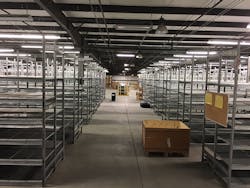LODI Group has consolidated ATP, Pioneer operations in a single warehouse location
Nobody enjoys moving – it’s exhausting and disruptive. For a business, particularly one involved in shipping a lot of products around the country, shifting operations to a new building can create all sorts of turmoil when it comes to order fulfillment.
But when these moves are well planned and executed, these moves can be beneficial. Automotive Technology Products (ATP) recently made a successful move when the company consolidated operations from a leased facility in Illinois to a facility in Meridian, Miss., owned by its parent company, LODI Group.
According to Jack Cameron, ATP’s vice president of sales and business development, the move was initiated in part because the owner of the leased Elk Grove, Ill. Facility wanted the company to commit to a long-term lease. Instead, ATP opted to consolidate with Pioneer in Meridian, which would also provide more square footage. Because there are some overlapping products between Pioneer and ATP, the two divisions were also able to consolidate their supply base to some degree, although they maintain separate brands because they serve different markets.
“LODI Group manufactures a lot of those products, and when LODI bought Pioneer ten years ago, they had stopped doing business with ATP,” Cameron says. “Now that we’re realigned and are one company, there are a lot of advantages.”
Cameron, formerly VP of sales at Pioneer, took the same position at ATP once the company consolidated sales and management functions. “We’re really in the final stage of the total integration of the two companies,” Cameron says.
With the move completed, all warehouse functions will be centralized in Meridian so that the two company’s can ship everything from a single location via a third-party logistics partner.
Cameron says there was square footage immediately available in the Mississippi location, and more opened up as Pioneer reorganized its storage. The company also added racking in the bulk storage area to accommodate the move.
“Over the years Pioneer had gone through a lot of changes and shed a to of core product lines,” Cameron says. “They sold a lot of products that have obsoleted themselves in the marketplace. That freed up space in the facility, and we’ve been able to utilize that existing space.”
The mezzanine area of the warehouse is now dedicated to ATP, and a conveyor system that had been shuttered has since been reactivated to help move product between the two levels of the building.
“For the rest of the facility we didn’t’ have to buy racking or storage, but we had to right-size the shelves,” Cameron says. At the time of the interview, Cameron said the company had maintained a 30-day inventory in Chicago, but anything beyond 30 days was shipping from Meridian. “All of the bulk items are in Meridian or on their way,” Cameron says. “We had a total of 111 semi-truck loads of product to be moved in 45 days.”
The consolidation with Pioneer has also helped solve some of the inventory problems that ATP experienced prior to the LODI acquisition. “When we bought the company they were shipping very poorly, and were on credit hold with their suppliers,” Cameron says. “For key and core categories, they had empty shelves. Their top selling product is stop leak, and they were completely out of the number-on selling SKU.”
As pat of the acquisition, all of those debts were satisfied by a holding company.
“There will certainly be some inventory savings because of duplication, but those product lines that were common to Pioneer and ATP, we were shipping hat product,” Cameron says. “In some cases we were taking finished goods in Pioneer boxes and repackaging them as ATP to the order fill back up and stop the bleeding.”
After 12 months of hard work, the order fill issues have been fixed, the company was shipping at nearly 100 percent, and the more streamlined warehouse operation was set to improve operations and reduce some costs.
“We still have one category that we have some supply problems with, but as a whole we are shipping at 95 percent as a company,” Cameron says. “We’re happy to report that we’re alive and well in that regard.”
About the Author
Brian Albright
Brian Albright is a freelance journalist based in Columbus, Ohio, who has been writing about manufacturing, technology and automotive issues since 1997. As an editor with Frontline Solutions magazine, he covered the supply chain automation industry for nearly eight years, and he has been a regular contributor to both Automotive Body Repair News and Aftermarket Business World.

